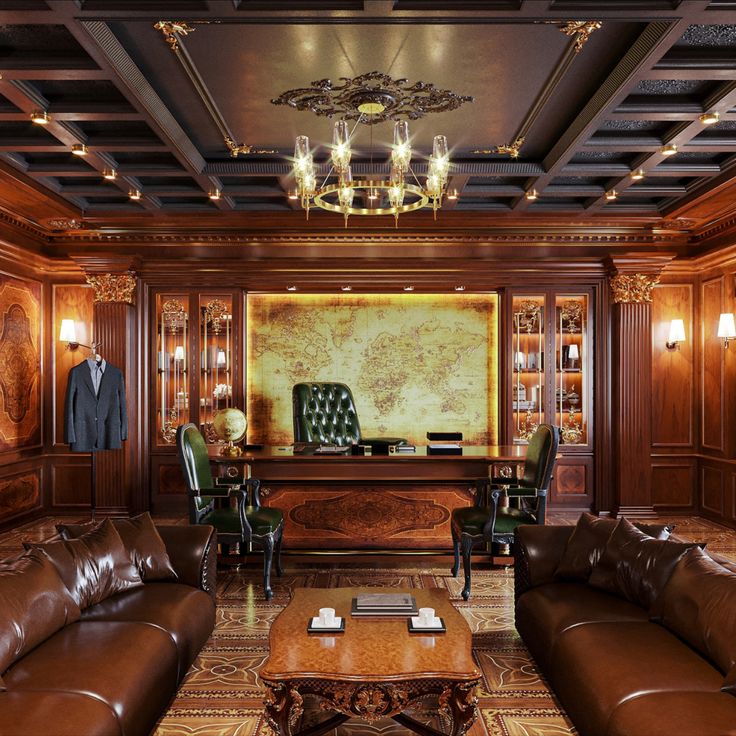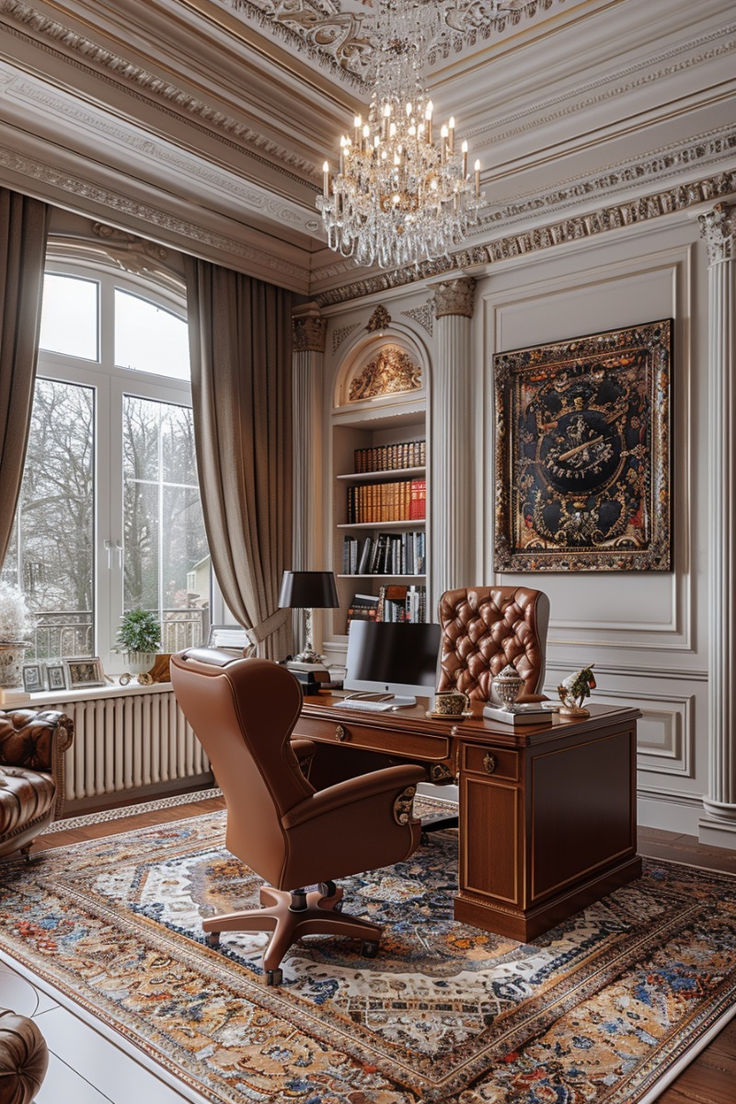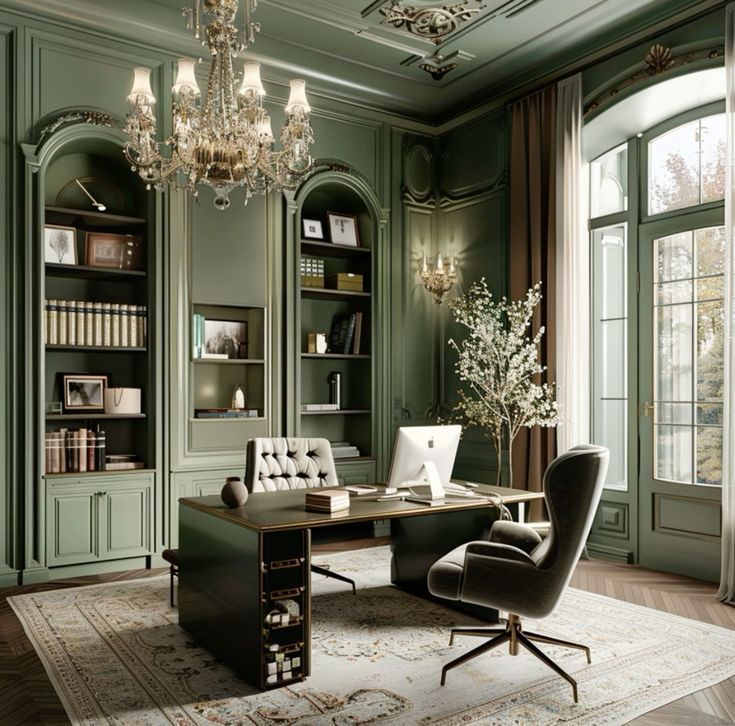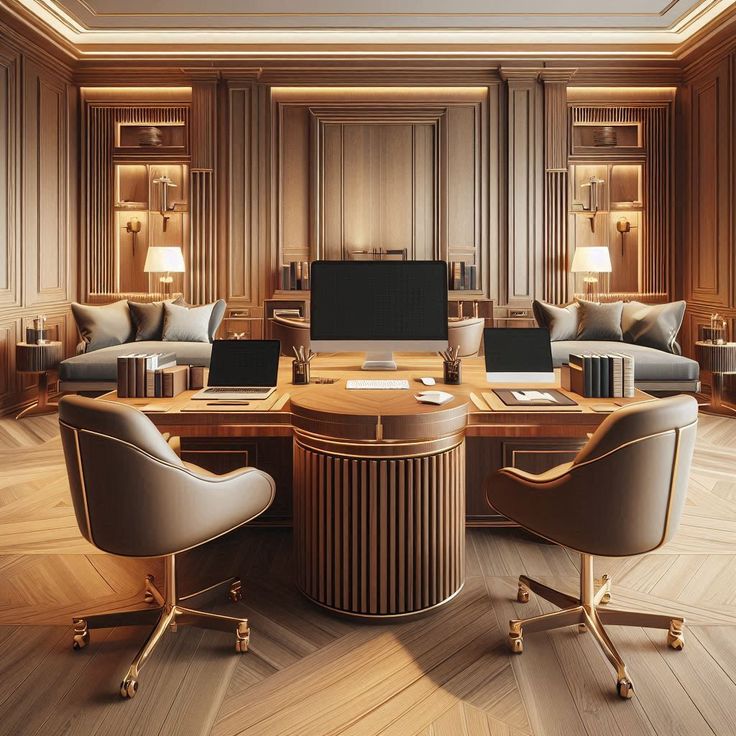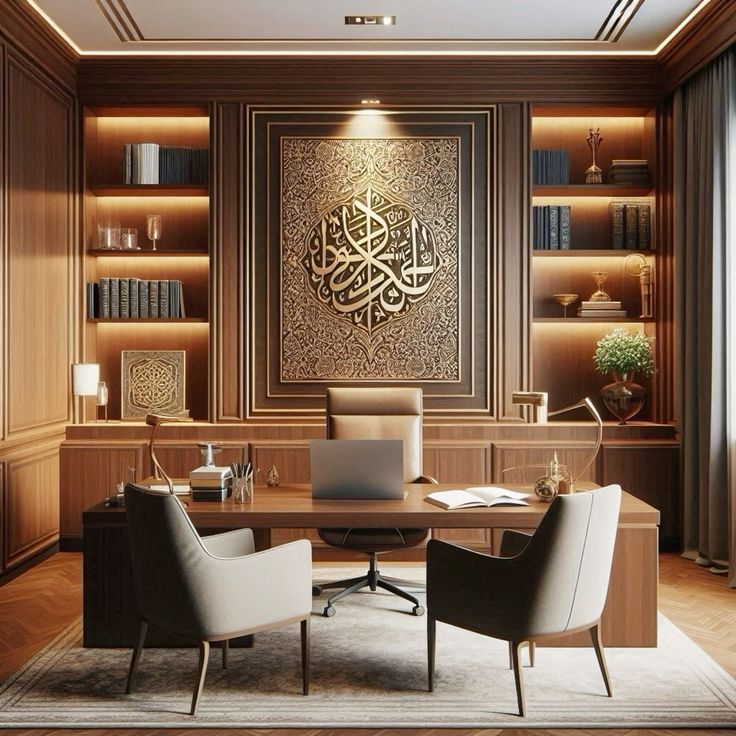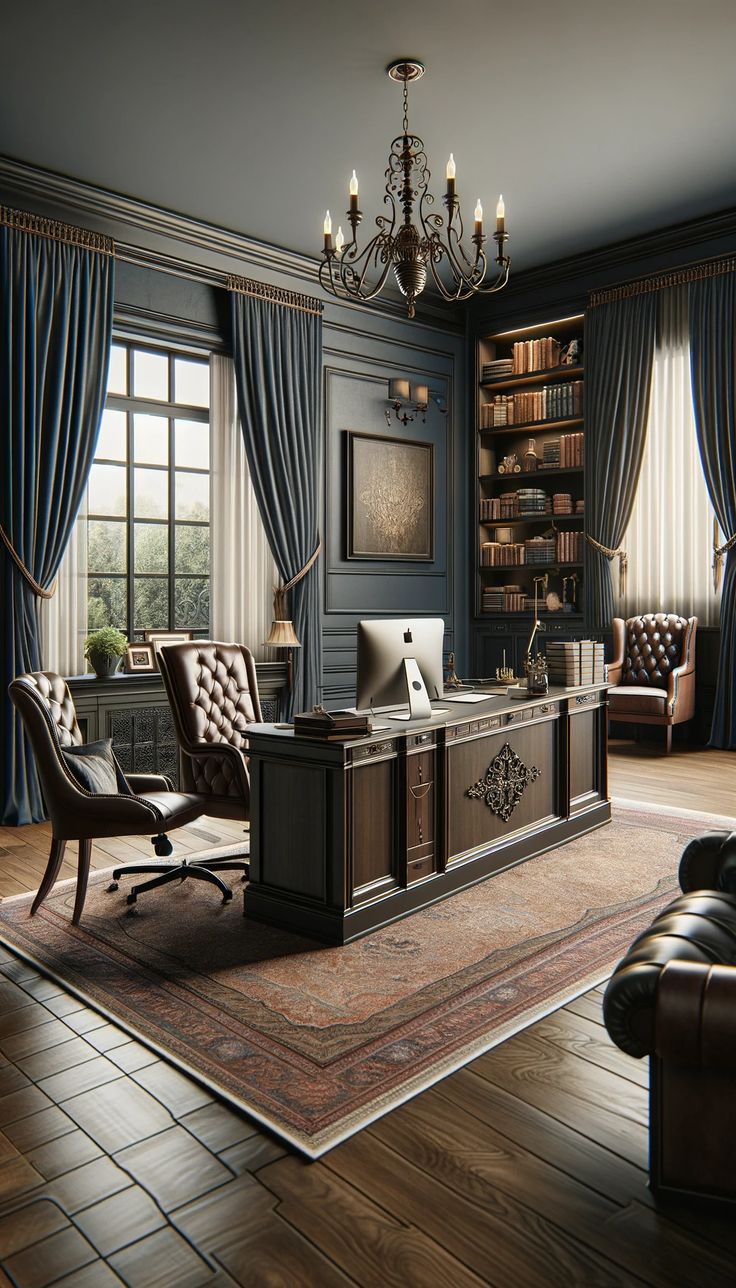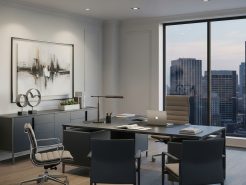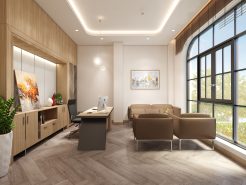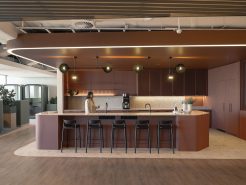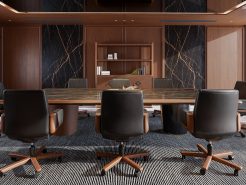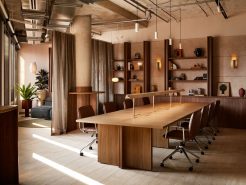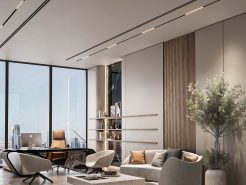In the design of Chairman Office, both Neoclassical and Classical styles are highly favored by business leaders. Especially for those in positions of power and influence within a company, these styles are ideal for creating a workspace that reflects authority, legacy, and success. Each style offers distinct characteristics, not only in form but also in the emotions they convey. So, which style is the most suitable choice for the president’s office? Let’s explore the differences between the Neoclassical and Classical styles and the timeless advantages of each.
1. Classical Style – A Symbol of Timeless Beauty
1.1. What is Timeless Beauty?
Classical style is deeply rooted in the culture of ancient Greece and Rome. Its hallmark is a blend of refined elegance, grandeur, and harmony in every detail. Elements such as columns, intricate decorative patterns, sharp lines, and an emphasis on the golden ratio are frequently incorporated in this design.
1.2. Luxury in the Design of the Chairman Office
A Classical-style president’s office is where functionality meets art. It doesn’t just fulfill practical needs; it also breathes life into the space with artistic values embedded in every meticulously crafted detail.
This functionality includes the beauty of each area:
Workspace:
The heart of the office, where the leader makes critical decisions, develops strategies, and sets the future direction for the business.
Reception Area:
Furnished with high-quality leather sofas, it offers comfort and warmth, making it an ideal setting for welcoming distinguished guests and leaving a lasting impression from the first meeting.
Meeting Room:
A space for important negotiations where strategic decisions are made, directly impacting the growth and destiny of the company.
Assistant’s Office and Waiting Area:
A flexible space for daily tasks, also serving as the first point of contact for visitors.
Rest Area:
A space for the leader to regain balance after intense work hours and continuous interactions, offering relaxation and energy rejuvenation.
1.3. The Artistic Touch in Classical Design
When we think of Classical style, grand palaces and castles come to mind, where every detail is carefully crafted by skilled architects with passion. A Classical-style president’s office is like a majestic palace, designed to reflect the power and authority of the leader, honoring their success and symbolizing their solid, timeless leadership in the competitive business world.
Colors in Classical Design:
In Classical interior design, color plays a crucial role in creating an elegant, historical, and luxurious atmosphere. The style is often associated with rich, refined tones like gold, beige, and dark brown, offering a warm, noble yet balanced environment.
Design Features:
In a Classical setting, every detail is meticulously crafted to create perfect beauty. The ceiling isn’t just a surface, but a work of art with soft, curving molding that lifts the space to a higher level, evoking the sense of ancient grandeur. These delicate curves not only soften the room but also create the feeling of entering a timeless, graceful world.
Gold Detailing:
Gold accents, often seen on the ceiling and walls, add a touch of brilliance and luxury. These shimmering gold details emphasize the intricate patterns and elevate the overall ambiance, creating a regal, opulent atmosphere as if stepping into a royal palace.
Materials and Furniture:
Classical style interiors are characterized by the use of premium materials such as fine wood, metal, and high-quality leather. These materials are selected not only for their durability but also for their timeless beauty, enhancing the luxury and sophistication of the space.
If you seek a space that exudes old-world charm with meticulously crafted, timeless artistic details, Classical style is the perfect choice. With its sophistication in every line and corner, this style transforms the workspace into a source of inspiration and elegance.
2. Neoclassical Style – A Symbol of Modern Harmony
2.1. Why Neoclassical is a Symbol of Modern Harmony
Neoclassical style blends traditional beauty with modern sophistication, giving classical elements a more contemporary twist. The Neoclassical style streamlines some of the more ornate features to create a luxurious yet modern space, maintaining the essence of timeless beauty but adding a layer of modernity.
2.2. The Design of Chairman Office in Neoclassical Style
Like other design styles, Neoclassical-style offices are designed with full functionality in mind—workspaces, meeting rooms, reception areas, assistant offices, and rest areas—all integrated in a way that balances elegance with modern conveniences.
For this design to be realized, a large area is essential. Only large companies or enterprises with their own office buildings or spacious office floors can provide the necessary space for these distinct zones. This not only represents the company’s strong development but also signifies the strategic vision and firm position of the leader in the business world.
2.3. Aesthetic Colors in the Neoclassical Chairman Office
Design
Neoclassical design embraces soft, neutral tones. Typically, it uses refined hues such as white, beige, light gray, and pale gold, or colors inspired by nature. This palette creates an environment that is both warm and luxurious, while also retaining a fresh, contemporary feel. The careful blending of colors not only provides comfort but also enhances the modern, dynamic nature of the workspace.
2.4. Modern Design in Neoclassical Style
In a Neoclassical president’s office, the design elements are simplified, avoiding excessive ornamentation and focusing on clean, streamlined lines. While maintaining the elegance of Classical style, the Neoclassical design incorporates modern sensibilities with minimalistic touches.
Ceiling Design:
Gone are the overly elaborate moldings of Classical design, replaced with sophisticated, modern ceilings that still exude elegance. Modern, subtle lighting elements like sparkling crystal chandeliers complement the space, adding a luxurious, sophisticated feel.
Wall Design:
The walls in Neoclassical interiors are simplified with straight lines and a contemporary aesthetic. Gone are the intricate, curved floral patterns of Classical design. Instead, sleek, minimalist designs create a sophisticated and refined workspace.
2.5. The Inner Beauty of Neoclassical Spaces
In Neoclassical design, high-quality materials such as natural wood, silk, velvet, and fine metals are used to enhance the elegance of the space while maintaining the timeless essence of the style. These materials not only bring luxury but also reflect the refined taste of the leader.
Decorative elements such as crystal chandeliers and glass vases add a touch of glamour, contributing to the luxurious feel of the office. These details work together to create a space that is both stylish and welcoming, offering a blend of luxury, comfort, and modern elegance.
Conclusion:
Whether you choose the “Neoclassical” or “Classical” design, both styles offer timeless beauty that merges sophistication with luxury. While Classical style emphasizes intricate, ornate details, Neoclassical offers a more streamlined, modern approach, preserving the elegance while simplifying the form.
Both styles assert the leader’s position and highlight the artistic value of design. They reflect the leader’s strong personality, offering a regal, sophisticated environment that symbolizes the perfect balance between the past and the present.
For more information on the design trends for a Chairman office in 2025, click here.
=====\
PROCE – PREMIUM OFFICE SOLUTIONS
Website: https://proce.vn/
YouTube: Proce Channel
Facebook: Proce Office Designs
Google Business: Proce Profile
LinkedIn: Proce LinkedIn
Hotline: 090.115.6767
#high_class_office_funiture
#high_end_office_funiture
#Chairman_Office_design
#Chairman_Office_interior
#Chairman_Office


